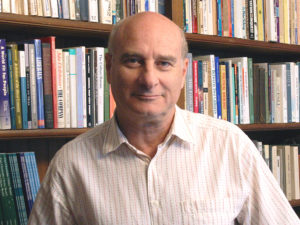All of His Business: AHA Lifetime Achievement Awardee Barry A. Kosmin Knows the Nones
 Barry Kosmin
Barry Kosmin Researcher Barry A. Kosmin knows a thing or two about the “nones.” In fact, the founding director of the Institute for the Study of Secularism in Society and Culture (ISSSC) coined the term to describe those who, when asked their religion or religious affiliation, respond “none”—or, if asked to pick from a list on a survey, check “none of the above.”
It’s a staple question on the American Religious Identification Survey, for which Kosmin has served as a principal investigator since ARIS’s inception in 1990. He’s also done national social surveys of religious (or irreligious) identity in Europe, Africa, and Asia and is a research professor of public policy and law at Trinity College in Hartford, Connecticut. Kosmin was the founding editor of Secularism & Nonreligion the world’s first journal dedicated to the investigation of secularism and non-religion in all forms, and he is a former joint editor of the journal Patterns of Prejudice. His books, based on the ARIS research, include One Nation under God: Religion in Contemporary American Society and Religion in a Free Market: Religious and Non-Religious Americans.
Kosmin will be honored for his work by the American Humanist Association on June 9 with a Lifetime Achievement Award.
I asked him what he thinks his work has meant to the secular community. “I think my major contribution was treating nonreligion equally with religion and moving it into the mainstream of social surveys and analysis of American society,” he says, adding that this recognition “aided morale in the secular/humanist movement and contributed to more people ‘coming out’ as irreligious/non-religious, atheists, agnostics, etc.”
Recently, it’s been reported that the percentage of nones in the US is now statistically equal to the percentages of both Catholics and evangelicals. Kosmin says the national trend was clear to him as far back as 2001 but that the rapid pace surprised even him, partly because he didn’t foresee the scope of the scandals in the Catholic Church, and that Catholic disaffiliation hastened the equivalency.
As rapid as the nones’ rise has been, however, Kosmin doesn’t see this demographic becoming the majority in the foreseeable future. He notes the myriad religious options people can choose from and that the religious tend to be more fertile than the nones. “Also there are 300,000 clergy who have their livelihoods on the line, which is a large interest group with many tax (financial) advantages that aid their survival.”
And while he can’t say that disaffection and alienation from organized religion has translated into major support for secularism and humanism from the younger generation, he does think the community has grown in confidence and self-awareness. While “this is not yet reflected in institutional or political strength,” Kosmin expects “this will be the next stage in its evolution if the momentum is to be maintained.”
Speaking of evolving, I asked him what he thought about the AHA’s big experiment this year with a virtual conference, free to all, and streaming in five different university locations around the country.
I think AHA is to be congratulated for thinking outside the box. Conference going, which involves travel and hotel costs, has become a financial hurdle for many people, so this seems a novel way to lower the cost of participation. Locating in universities is also symbolic as it helps to emphasize that humanism is a serious enterprise with deep intellectual roots.
Kosmin will accept the AHA Lifetime Achievement Award at the University of Miami on Sunday, June 9. For more information on how to register for the Miami location or for the webcast, visit conference.americanhumanist.org.
